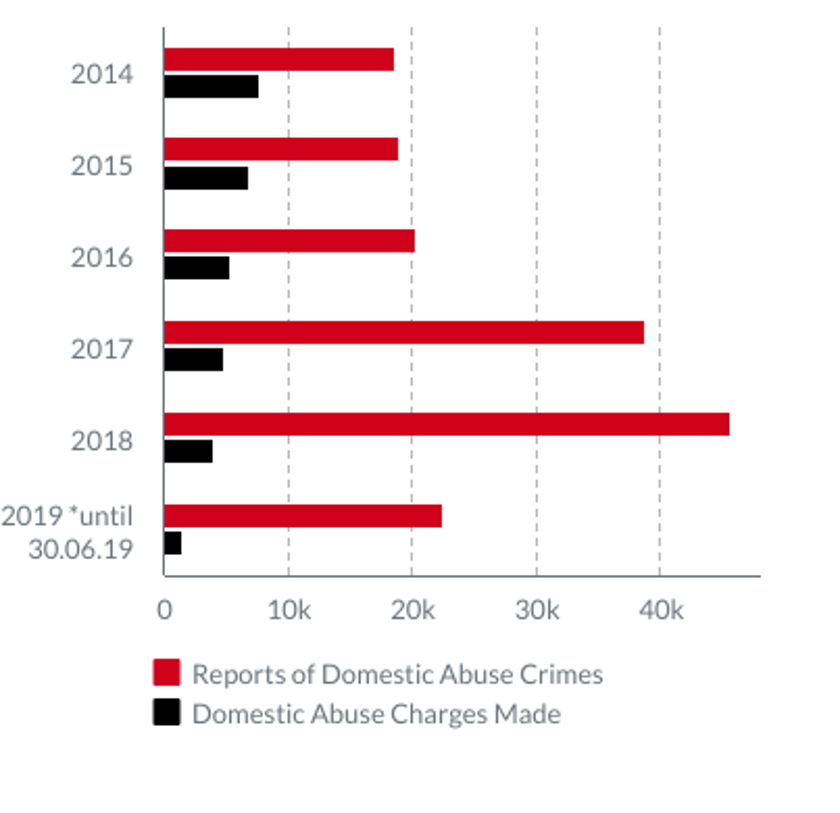A staggering 45,713 reports of domestic abuse related crimes were made to the Greater Manchester Police in 2018, yet only 3,959 lead to charges.
The number of domestic abuse related crimes reported to the GMP has dramatically increased over the past five years, with 18,668 reported in 2014 compared to 45,714 in 2018.
Whilst data from 2019 is currently only available up to June, it is estimated that it is likely to match or even increase on the figures from 2018.
By June 2019, the GMP had already recorded 22,410 reports of domestic abuse crimes, almost half of the number reported for the entirety of 2018.
In the past five years, there was a stark difference between the number of domestic abuse related crimes that are reported to the police and the number of reports that actually lead to charges being made.
Yet most noticeably, this number has actually decreased over the past five years in comparison to the increasing number of domestic abuse crimes being reported, with 7,761 charges made in 2014 and 3,959 in 2018.
The increase in reports does not necessarily suggest that more domestic abuse crimes are occurring, but rather that more victims are coming forward.
However, victims appear to be facing barriers that prevent them from feeling they can take further action against their perpetrators.
Sophie Francis-Cansfield from Women’s Aid said: “It’s really important to acknowledge that before the point where women are actually able to phone the police or another kind of criminal justice agency to seek help they face really enormous barriers.
“Especially in regard to overcoming the belief and the fear that the police cannot or will not help them.”
Women’s Aid are pressing for better responses from the police and the CPS towards domestic abuse cases.
“Whilst it’s become more of a priority for the police and the criminal justice system, we are concerned that there continues to be reports of poor responses and forces using their powers to protect victims remains fairly inconsistent,” said Francis-Cansfield.

Rebecca Hall from the Trafford Rape Crisis Centre suggests that a major factor inhibiting victims from feeling they can come forward to report or press charges is a judicial systematic failure.
“The CPS were exposed for having underhand targets for rape convictions. So yeah, it’s definitely a systematic failure deep within the justice system,” she said.
“[In] the time I’ve been working on the helpline actually no one has said they’re going to take their claim forward to the police.”
Hall further claimed that victims tend not to report or press charges in an attempt as self-protection or self-preservation.
“At the moment victims are discouraged from taking counseling whilst they’re in the judicial process because it may stand against their claim,” she explained.
“So when women are faced with do I get emotional support and counseling or do I take my perpetrator to court a lot of them will naturally choose to actually look after themselves.”
In other instances, victims of domestic abuse do not come forward to the police as they do not recognise their situations as domestic abuse or coercive control.
Speaking to a victim of domestic abuse, who shall remain anonymous, it became clear that the general consensus is that for abuse to constitute as domestic abuse it has to involve physical violence.
“I used to go see [Women’s Aid] at my GP every couple of weeks just to help understand the coercive control, because in my case it was financial abuse, sexual abuse, psychological emotional and coercive control and I didn’t even understand any of those things.
“He didn’t actually do anything that you think you could [report]. I thought it was only physical abuse you could [report].”
More legislature and education on domestic abuse could help increase the number of victims coming forward or pressing charges.
“Absolutely there should be more legislation and understanding coercive control,” she said.
“Once you learn, there is a pattern, but I think it should be taught in schools. I want to be able to show my granddaughters and my daughters that you don’t put up with this.”



